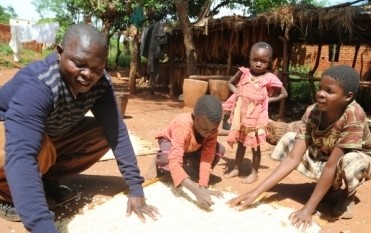
Lezias Sauzande (39) and his four children can now afford to live a decent life in areas of food, shelter and clothes, thanks to World Vision who introduced Vision Fund for communities to get loans to finance their farming and family business ventures.
The once poverty-stricken Sauzande hails from Chisepo in Village Head (VH) Nkhanyu, Traditional Authority (T/A) Kayembe in the Central Region District of Dowa in Malawi. The region is well known for both subsistence and commercial agricultural and livestock production.
World Vision—through Vision Fund—has been supporting farmers with loans after it was discovered that most people were unable to promote their agricultural careers or business due to lack of funds.

Sauzande’s life was affected by extreme poverty, he admits. His children used to wear angry faces each time it was time for breakfast, lunch and supper because food was not insight. They were subjected to begging at times in nearby families, a thing that portrays lack of parental care in some instances.
“There were no loans before for farmers and a person like me. We lived and slept in poverty. My children had no kind words for me as a parent for I failed them in various educational, nutritional and healthy circles.
“During Christmas time, it was even worse because they (children) expected a surprise such as nice food and clothes as is expected always not only in Malawi, but other countries too,” says Sauzande.
Now, Sauzande says since 2015, such poverty challenges are a thing of the past, thanks to loans provided by Vision Fund, which is a component of World Vision International.
And Indeed, since last year, when he realized the need to start getting loans from Vision Fund following a training, something seem to be heading towards the right direction at family and community levels.
A visit to his house in Chisepo Area Programme (AP) of World Vision showed that he is more into goat farming. He also, together with his family does crop production.
During that occasion of the visit, his children were seen helping him put maize in the sun, while on the other hand Sauzande was busy checking on the health status of the goats.
“I do this for my children. And I also invest much so that when they reach secondary school level I should not lack school fees. You know, the future of the nation lies in children and that is why I want to do more of crop and livestock farming,” he says.
Besides livestock and crop production, Sauzande does some tomato and Irish potato businesses. He says proceeds from his tomato and Irish potato business are channeled towards village savings bank to broaden profits.
“I want to venture into a big business that will give me more profits,” he says. Sauzande could not value his business and livestock, saying time is not ripe.
For his family, having bumper maize harvests, 13 chickens and well established goat farming means that they are now safe from poverty.
His four children can now afford to share a laugh and eat, dress and sleep well, thanks to World Vision, which is implementing various projects in the area with support from its support office called Australia.
“When I got a loan last year, I paid 20 percent as interest. I felt it was on the lower side in terms of repayment as opposed to other lending institutions whose rates are scary. This forced me to get another loan to buy chickens,” he says.
Initially, when World Vision intervened, each family interested in getting loans was given to improve their business and farming careers, says Sauzande, who is also chairperson of the conservation Agriculture club.
The club seeks to champion farming that does not depend on much rains and fertiliser, but rather modern farming such as potholing system in view of climate change effects.
“When I got the loan at first, I decided to buy three goats. Such goats have now bred and I have 10 of them. Additionally, I am also doing the tomato and Irish potato selling businesses to supplement my financial status,” says Sauzande.
In those days, he recalls that maize fields were ruined too due to climate change, which paved the way to famine in his family and community as whole thereby triggering high levels of hunger.
Malawi’s health authorities say more than a half of under-five in Nkhanyu, children were affected by malnutrition until the World Vision driven projects of village savings and loans, food security, health and education.
Robert Mitomoni, Area Program manager for Chisepo which gets its funding from World Vision Australia says through Vision Fund, families have had their lives transformed socially and economically.
He said it was the wish of the organisation and its support offices or funders globally to see lives of children—who are at the core focus of World Vision—changed positively.
“With this initiative, households who get loans from Vision Fund venture into both commercial and subsistence farming to uplift their lives,” he said.
World Vision in Chisepo has also engaged publics into greenfields where new farming methods like conservation agriculture (CA) are being tested.















True guy
Good move. Koma osaiwala; Banja lalikulu udindonso
ochuluka. Use contraceptives to manage your family planning.
Gys kumalelako iiiii hiyaaa 39 years 4 chailds
AlHaMdUlIlaH
I love this
Thanks keep it up that’s good wisedom and good leadership.
Ilike this organisation
39 yrs 4 childrens koma yaaa
thats very good… thanks to World Vision!